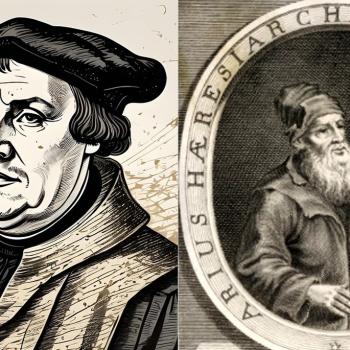By The Cross Examinations Group The Cross Examinations series invites prominent Christian pastors, professors, and writers with diverse points of view to explore questions of vital importance to the church in a coherent and constructive manner. We hope that reflecting together will stimulate thought, focus conversation, and ultimately prove more edifying to online readers and to the church. Previous installments in the series have considered theological renewal amongst evangelical churches, the right relationship between evangelistic and social justice ministries, evangelicalism and homosexuality, and immigration reform.
The Cross Examinations series invites prominent Christian pastors, professors, and writers with diverse points of view to explore questions of vital importance to the church in a coherent and constructive manner. We hope that reflecting together will stimulate thought, focus conversation, and ultimately prove more edifying to online readers and to the church. Previous installments in the series have considered theological renewal amongst evangelical churches, the right relationship between evangelistic and social justice ministries, evangelicalism and homosexuality, and immigration reform.
The present installment opts for a lighter subject. Here at the beginning of the summer, we thought it would be enjoyable to recommend to one another the books that have most profoundly transformed our lives, and the books that are most commonly and detrimentally overlooked amongst our fellow Christian believers. (And, for the first time, the same question was posed at Patheos' Mainline Protestant Portal.)
The questions were put thus:
Apart from the Bible, what book has most deeply affected your faith life in the past ten years? And, is there any book that few Christians read, but every Christian should read?
Click below to view the responses:
David Buschart, Professor of Theology and Historical Studies at Denver Theological Seminary
Tim Challies, popular author, editor of Discerning Reader, and leading blogger at Challies.com
Timothy Dalrymple, Associate Director of Content for Patheos.com, and manager of the Evangelical Portal.
Marcus Goodyear, Senior Editor of TheHighCalling.org and the Faith in the Workplace online feature for Christianity Today
Douglas Groothuis, Professor of Philosophy at Denver Theological Seminary, and blogger at The Constructive Curmudgeon
Kathleen Mulhern, Managing Editor of Patheos.com
C. Michael Patton, President of Reclaiming the Mind Ministries and blogger at Parchment and Pen
 David Buschart is Professor of Theology and Historical Studies at Denver Theological Seminary.
David Buschart is Professor of Theology and Historical Studies at Denver Theological Seminary.
One of the books that have most deeply affected my faith life in the past ten years is a book that I first read long before the year 2000. I continue to be increasingly impressed with the significance and challenges associated with the relationship between Christianity and culture, and H. Richard Niebuhr's Christ and Culture (lectures delivered, 1949; first published, 1951) continues to inform my thinking about this significance and these challenges.
Niebuhr's book is not perfect. It is not the last word on the subject. Numerous authors in recent years, in both article- and book-length treatments, have taken Christ and Culture to task, identifying weaknesses, distortions, and inadequacies, as well as offering their own alternative renderings on the topic of Christianity and culture. And, it is best to read at least some of this literature in conjunction with Niebuhr's book, because many of these authors also have worthwhile things to say.
This acknowledgment made, I return to the prompt-question and respond, Niebuhr's Christ and Culture continues to be a (not the, but a) very important touchstone for my own reflection on how I and the Christian community of which I am a part can be rightly related -- in both thought and deed -- to my/our culture. This relationship has always been and will continue to be of foundational import for Christians, both individually and collectively, and there has always been and will continue to be many Christian understandings of this relationship.
For myself, acknowledging the flaws alluded to above, I continue, for example, to find Niebuhr's basic typology-Christ against culture, Christ and culture in paradox, Christ the transformer of culture (Niebuhr's commendation), Christ above culture, Christ of culture -- helpful in understanding the landscape of many (most?) Christian views of culture, both past and present. Beyond this, reading Niebuhr's book was the occasion for me to first be impressed with the pervasiveness, persistence, and importance of the question of culture -- an impression that has only grown in recent years.
It may be too soon to claim (by whomever has the authority to claim such things) that Christ and Culture is a Christian "classic," but to date it certainly has been a landmark text -- whether in agreement or disagreement -- for many people, including me.
As for the second question -- regarding a book that few Christians read, but every Christian should read -- I will cheat by recommending not a book but a category, if you will. Far too few Christians -- certainly, too few American evangelical Christians -- read old books. All Christians should read old books. (For a thoughtful essay on this, see C. S. Lewis, "On the Reading of Old Books," in God in the Dock, ed. Walter Hooper [Grand Rapids: Eerdmans, 1970], pp. 200-207.) And, in thinking "old," think every century (for they all have something to offer) back to the early post-Apostolic era.
I won't attempt an entire "case" for this suggestion other than to offer one observation. We live in a culture that claims to prize and celebrate diversity; and, it is also a culture that tends, at the least, to ignore if not dismiss that which is old. There is an irony here, for exploring that which is old is one of the best ways to enjoy some of the fruits that we claim to seek in our celebration of diversity -- being challenged and enriched by people who see things differently than we do, who see different things than we do.
For those who might want to explore distinctively Christian "classics," the Christian Classics Ethereal Library ( www.ccel.org) can be a helpful place to start.
If you have been able to read this essay, thank a teacher. If you are a Christian, thank the faithful who have gone before.




